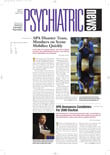National Institutes of Health (NIH) Director Elias Zerhouni, M.D., unveiled a final rule in late August addressing how NIH staff members should disclose certain financial interests, stock divestiture, outside activities, and awards that could present conflicts of interest to their official NIH duties.
The rule is the result of close collaboration between the Department of Health and Human Services (HHS), NIH, and the Office of Government Ethics after an extended, in-depth review of numerous comments about interim ethics guidelines submitted by its staff, the public, and scientific organizations. The Office of Government Ethics is the federal agency that sets ethics standards for all employees in the government's executive branch.
“We have a balanced set of conflict-of-interest rules that protect the integrity of NIH and its ability to provide the American public with an unbiased and trusted source of scientific and health information,” Zerhouni said in a prepared statement. The final regulations balance that protection with “preserving [NIH's] ability to recruit and retain world-class scientists and staff.”
The development of the final rule revolved around three themes:
•
The public must be assured that NIH research decisions are based on scientific evidence and not on inappropriate influences.
•
Senior management and people who play an important role in research decisions must meet a higher standard of disclosure and divestiture than people who are not decision makers.
•
To advance the science and stay on the cutting edge of research, NIH employees must be allowed interaction with professional associations, participation in public health activities, and genuine teaching opportunities.
The final rule “will help NIH and its employees maintain the highest ethical standards,” said HHS Secretary Mike Leavitt, “while sustaining their ability to conduct and support the best medical research in the world.”
The final rule includes a prohibition on outside consulting by NIH staff with “substantially affected organizations,” such as pharmaceutical, biotechnology, and medical device manufacturing companies; health care providers and insurers; and supported research institutions.
All “senior NIH employees” and their spouses and minor children are prohibited from owning more than $15,000 worth of stock in“ substantially affected organizations” and are required to divest any holdings exceeding $15,000.
“Senior employees” are defined by the final regulations as“ the NIH director and deputy director; all direct reports to the NIH director; all institute or center directors, deputy directors, scientific directors, and clinical directors; extramural program officials who report directly to an institute or center director; and other employees designated as such because they possess equivalent levels of decision-making responsibility.”
Other employees may be required to divest if an NIH review determines there is a potential conflict resulting from employees' holdings (or those of a spouse and minor children) that would interfere with their ability to do their government job.
Further, “Receipt of monetary awards from outside sources will continue to be contingent upon prior approval and be limited to awards that have been determined through a prescreening process to be bona fide.” Senior employees are barred from receiving any cash component of prescreened awards offered by donors who have matters pending under their official responsibility.
Employees will be required to file an annual financial disclosure report detailing any interests in substantially affected organizations, as well as those of a spouse and minor children, and to indicate the amount.
Individuals who are not employees of NIH but serve as clinical investigators on an NIH study are also required to report any interests in substantially affected organizations.
The final rule permits outside activities with professional or scientific organizations, service on data- and safety-monitoring boards, grand rounds lectures, and scientific grant review committees, subject to prior approval by NIH ethics officials.
NIH scientists will be able to continue, to the extent allowed under existing governmentwide rules and with prior approval, to pursue outside activities “such as teaching courses at universities, writing general textbooks, performing scientific journal reviews or editing, and providing general lectures to physicians and scientists as part of a continuing professional education program. NIH scientists can also engage in the practice of medicine and other health professions with prior approval.”
Zerhouni noted that the NIH leadership is “developing procedures and information systems to implement the final regulations and will hold extensive training sessions with staff over the coming months.”
The final rule, titled “Supplemental Standards of Ethical Conduct and Financial Disclosure Requirements for Employees of the Department of Health and Human Services,” and additional information are posted at<www.nih.gov/about/ethics_COI.htm>.▪
